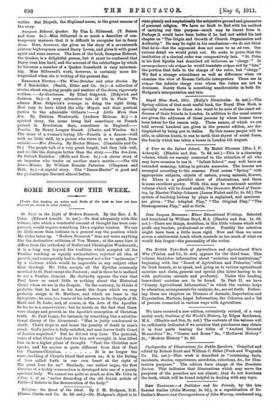SOME BOOKS OF THE WEEK.
[tinder this heading we notice such Books of the week as have not been reserved for review in other forms.]
St. Po ,41 in the Light of Modern Research. By the Rev. J. R. Cohu. (Edward Arnold. 5s. net.)—To deal adequately with this volume, into which a wonderful amount of thought has been com- pressed, would require something like a regular treatise. We can do little more than indicate in a general way the position which Mr. Cohu takes up. "Modern Research" does not mean anything like the destructive criticism of Von Manen ; at the same time it differs from the orthodoxy of Sadler and Christopher Wordsworth; it is a long way beyond the tradition which accepted all the Pauline teaching as equally authoritative, rejected all idea of growth, and consequently had to dispose of not a few "antinomies " by a violence which would be impossible in any subject other than theology. Mr. Cohu accepts all the Epistles commonly ascribed to St. Paul except the Pastoral ; and in these he is inclined to see a Pauline element. He distinctly opposes the view that Paul knew or cared little or nothing about the Historical Christ whom we see in the Gospels. On the contrary, he thinks it probable that he had in his hands the Logia which we may probably assign to St. Matthew, and which we trace in the Synoptists ; he sees, too, traces of his influence in the Gospels of St. Mark and St. Luke, and, of course, in the Acts of the Apostles. So far he is a conservative : but he insists on the fact that there were change and growth in the Apostle's conception of Christian truth. St. Paul began, for instance, by something like a substitu- tional theory of the Atonement : "Man is justly condemned to death. Christ steps in and bears the penalty of death in man's stead. God's justice is fully satisfied, and man leaves God's Court of Justice acquitted." But he did not stop here. The personal, sense of what Christ had done for him and wrought in him lifted him on to a higher plane of thought. " Paul the Christian now speaks, and his answer is quite different from that of Paul
the Pharisee-Christian It is no longer the mere shedding of Christ's blood that serves us; it is the feeling of love called forth in our own heart at the sight of His great love for us." Similarly, our author urges, his first doctrine of a bodily resurrection is developed into one of a purely spiritual body. We cannot see quite so much as does Mr. Cohu in 2 Cor. v. of an " entire discarding of the old Jewish article of Faith—I believe in the Resurrection of the body."










































 Previous page
Previous page